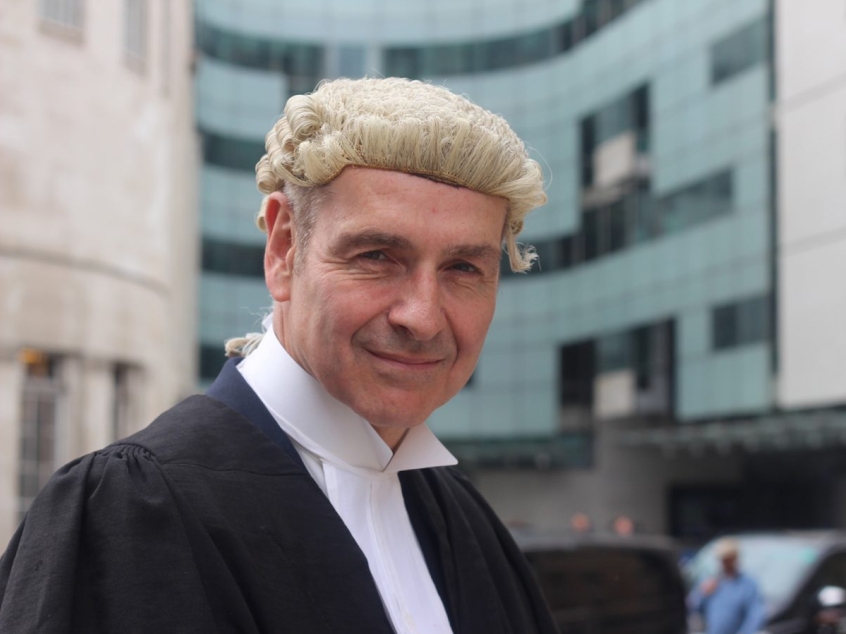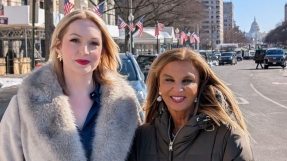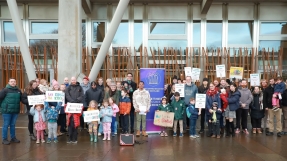
Senior UK Barrister Paul Diamond has over 30 years of experience representing Christians in the High Court, the Supreme Court and European Court of Human Rights.
He was Standing Council to the Keep Sunday Special Campaign in 1988, and later to the Christian Legal Centre from 2008 to 2018 during which time he was involved in a number of high profile cases involving Christians.
He speaks to Christian Today about why he has decided to give up his wider practice and focus on the rights of Christians to manifest their faith in the public square.
CT: Why have you decided to shift your attention full-time to the rights of Christians?
Paul: I think we're getting to a very frightening stage in Britain where there are clear authoritarian tendencies and a total collapse of trust in government. In fact, I don't think I've ever seen the country so hostile to Christianity - and also so divided, for example on issues like Covid. We don't have to go too far to see how some societies have gone off the rails, so we are in very choppy waters at the moment.
CT: Looking at all of the cases involving Christians over the years, would it be fair to say that there has been an escalation of discrimination?
Paul: There definitely has been. The country is becoming very secular. Paganism is growing, as are other religions that have their own values and their own sense of right and wrong. And the Church, sadly, is lacking in proper leadership; it just hasn't been there. And so there has been this proliferation of quite extreme conspiracy theories. But when you look into what's happening, for example with the introduction of LGBT teaching to 3 year olds, this isn't being done by some covert international organisation. It's our own government that's doing it because they think it's politically expedient and will win them votes.
So there definitely has been an escalation in discrimination against Christians but I also think we need to be clever in how we respond to that and avoid a sort of foolish 'whipping up'. There is a sensible resistance and lots of practical things we can do to respond, like parents coming together or Christians choosing to stand as school governors. There are lots of sensible approaches we can take instead of pleading helplessness and putting some people off.
CT: You recently reached out to the police to suggest a 'street preacher's charter' to stop evangelists being arrested. What prompted that?
Paul: There are things we can say about certain issues that are labelled hate speech, but if you say something against, for example, Trump, Israel or Christians, suddenly it becomes 'free speech'.
In the recent case of Harry Miller, for example, the police came to his workplace and it was said that they wanted to check his thinking.
With the street preachers, what tends to happen is that they are arrested but not prosecuted, but it still has a chilling effect on free speech.
Police officers are very busy and are under an incredible amount of woke pressure, but there is also a lot of goodwill among police officers. There are a lot of good, hard-working police officers out there who want to make society a better place.
They don't necessarily know what the law says around free speech and the different protected groups, because the law around this is quite complex, so a charter would make it clear what they can and can't do around free speech, and that there is freedom under the law to express different views on issues like homosexuality and abortion.
CT: Many cases involving Christians relate to the workplace. Would a similar charter be helpful for employers?
Paul: When you look at an authoritarian state, it's the government and government employees silencing people. But in many ways we've already gone beyond an authoritarian state because what we have now is private corporations that are even more extreme than the governments! It used to be the corporations who were hostile towards government. Now they seem to be working in cooperation with the government! So we see, for example, social media platforms removing anyone they don't like - including lots of Christians - and the silencing of free speech. And we see the same with employers.
One of the cases I was involved in was Nadia Eweida vs British Airways. This is a huge company, working with some of the biggest law firms, which introduced a policy that meant staff were able to wear religious items like turbans and hijabs but not a cross the size of a five pence piece or the Jewish Star of David. It defies imagination.
But to give an indication of the state of play in Britain, I have been involved in a few cross cases over the years and, overall, 13 British judges right up to the Supreme Court ruled against the cross, saying it was simply a piece of jewellery and that no discrimination had occurred because if a Muslim wore one they would be treated the same. It took a Polish judge - someone from an ex-communist country - at the European Court of Human Rights to rule that the cross is a Christian symbol.
Another case in point was Gary McFarlane who was sacked as a marriage counsellor because he wanted an exemption from working with same-sex couples. It would have been a simple matter of accommodating him but instead he was dismissed for gross misconduct - the worst kind of behaviour.
What stuns me about all this is that these Christian employees are very often the best. They are good, upright, honest people who 50 years ago employers would have been falling over themselves to hire. You would think employers would be desperate not to lose them.
CT: A lot of cases involving street pastors and Christians are related to hate speech and hate crime laws. Should these laws be removed from the statute books?
Paul: Yes they should. The trouble with these laws is that they are incoherent. Nobody really knows what a hate crime is. And the laws are not applied consistently so they end up not addressing the real problems but rather just creating more problems. The law should apply neutrally and equally to everyone. But it all generally reflects a weakening of the Christian foundations of our society as there's no agreement anymore to what's right or wrong.
CT: Every now and then there are some victories where the courts go in favour of the Christians so do you have any hope that the current climate might change for the better?
Paul: Yes and that's why I want to get stuck into this more. You might not like Christian views but just because you don't like someone's views doesn't mean you should silence them. There are many allies even from non-Christian backgrounds who would support that position.
CT: Lord Carey recently instructed you to work on trying to make it easier for religious minority refugees, including Afghan Christians, to come to the UK. How is that going?
Paul: This has actually been a very serious failing of the Church. In Afghanistan there are about 12,000 Christians, all converts from Islam and labelled apostates who are being hunted down by the Taliban and have nowhere to go. Every country in the region, whether Pakistan, Iran and so on, are all quite extreme Islamic states and in each of these countries, the Afghan Christians will be considered apostates. If we can even get a handful of these Christians out, it would be better than nothing.
CT: Looking ahead, where do you expect to see more legal battles? Do you see an emerging frontline?
Paul: For me, there are two emerging frontlines. One is the use of professional conduct committees. We are increasingly seeing a lot of these non-legal professional bodies going against teachers, doctors, lawyers and saying you can't practise your profession because of your beliefs.
The other frontline may just be my own personal view but there is increasing cooperation between the media and the government in a way that is very similar to Russia. If you look at Russia, Putin controls several TV stations. You can stand on a soap box in Moscow but you can't actually get your ideas out.
Here in the UK we have all the private players singing from the same hymn sheet and producing the same programmes. I'm worried about that because it doesn't just affect Christians. If people can't get heard they might get desperate.













